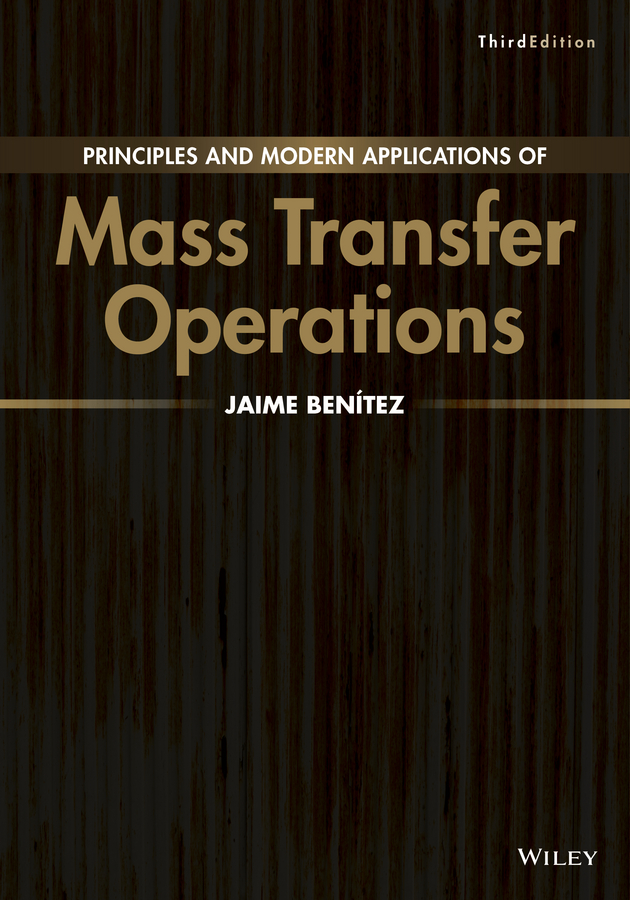Электронная книга: Jaime Benitez «Principles and Modern Applications of Mass Transfer Operations»

|
A staple in any chemical engineering curriculum New edition has a stronger emphasis on membrane separations, chromatography and other adsorptive processes, ion exchange Discusses many developing topics in more depth in mass transfer operations, especially in the biological engineering area Covers in more detail phase equilibrium since distillation calculations are completely dependent on this principle Integrates computational software and problems using Mathcad Features 25-30 problems per chapter Издательство: "John Wiley&Sons Limited"
ISBN: 9781119276951 электронная книга Купить за 9652.07 руб и скачать на Litres |
Jaime Benítez
Jaime Benítez (
Early life
Benítez was born in
Career
In 1931 Benítez began a career in education at the
As chancellor, Mr. Benítez also attracted many distinguished scholars and artists who had left Spain after its civil war, including Nobel Prize-winning poet
Benítez published numerous articles, essays, and books. An important contributor to the development of higher education in Puerto Rico, Benítez was the author of a number of books that concern the university system, including Junto a la Torre -- Jornadas de un programa universitario (1963); Etica y estilo de la universidad (1964); La universidad del futuro (1964); and Sobre el futuro cultural y político de Puerto Rico (1965). From 1956 to 1971 he was the director and a contributor to La Torre, the University of Puerto Rico literary review. In addition to his academic career, Benítez also maintained an active role in numerous national and international organizations: he was a member of the United States National Commission for the United Nations Educational, Scientific, and Cultural Organization (
A close associate of the political leader
In 1966, the university statutes were changed again to permit greater political activity on the campus and Mr. Benítez was effectively kicked upstairs to the new and less powerful post of university president, which he gave up in 1971 due to political pressures under the first non-PDP administration since the 1930's.
In 1972 Benítez was elected
On September 8, 2008, the IAU unveiled the publication of a biography of Benítez, edited by former San Juan mayor
Death
He died in 2001 and is survived by his wife, the former Lulu Martínez; two daughters, Clotilde and Margarita, of Washington, and a son, Jaime, of Albany.
External links
* [http://www.loc.gov/rr/hispanic/congress/benitez.html Hispanic Americans in Congress: Jaime Benitez]
Источник: Jaime Benítez
Другие книги схожей тематики:
| Автор | Книга | Описание | Год | Цена | Тип книги |
|---|---|---|---|---|---|
| Jaime Benitez | Principles and Modern Applications of Mass Transfer Operations | A staple in any chemical engineering curriculum New edition has a stronger emphasis on membrane separations, chromatography and other adsorptive processes, ion exchange Discusses many developing… — John Wiley&Sons Limited, электронная книга Подробнее... | 9652.07 | электронная книга |
См. также в других словарях:
Mass spectrometry — (MS) is an analytical technique that measures the mass to charge ratio of charged particles.[1] It is used for determining masses of particles, for determining the elemental composition of a sample or molecule, and for elucidating the chemical… … Wikipedia
HISTORICAL SURVEY: THE STATE AND ITS ANTECEDENTS (1880–2006) — Introduction It took the new Jewish nation about 70 years to emerge as the State of Israel. The immediate stimulus that initiated the modern return to Zion was the disappointment, in the last quarter of the 19th century, of the expectation that… … Encyclopedia of Judaism
Mathematics and Physical Sciences — ▪ 2003 Introduction Mathematics Mathematics in 2002 was marked by two discoveries in number theory. The first may have practical implications; the second satisfied a 150 year old curiosity. Computer scientist Manindra Agrawal of the… … Universalium
Business and Industry Review — ▪ 1999 Introduction Overview Annual Average Rates of Growth of Manufacturing Output, 1980 97, Table Pattern of Output, 1994 97, Table Index Numbers of Production, Employment, and Productivity in Manufacturing Industries, Table (For Annual… … Universalium
physical science, principles of — Introduction the procedures and concepts employed by those who study the inorganic world. physical science, like all the natural sciences, is concerned with describing and relating to one another those experiences of the surrounding… … Universalium
tunnels and underground excavations — ▪ engineering Introduction Great tunnels of the world Great tunnels of the worldhorizontal underground passageway produced by excavation or occasionally by nature s action in dissolving a soluble rock, such as limestone. A vertical opening … Universalium
